Schedule a Call Back
Indo-German partnership: a long-term bond
 Technical Articles
Technical Articles- Dec 01,16

German investment in India has been on a rise over the past 50 years or more and now new sectors are being tapped to make the relationship stronger.
Big opportunities for Indo-German industrial and trade collaborations have been in existence for a long time. However, these are now set to foray into new verticals, one of them being power. This was made evident at the 7th session of Indo-German Energy Forum (IGEF) and related meetings that took place in Hamburg and Berlin from September 27-30, 2016. German companies are looking at the energy opportunities available in India in a big way. Two companies – Senvion and Uniper – have already invested in India as a part of the ‘Make in India Mittlestand’ (MIIM) programme. The need for a greater focus on attracting more such companies and enhancing the development cooperation segment in the field of energy, including renewable energy, were discussed in the meetings of the IGEF.
“Concurrent with the commitments made by Government of India following the COP21 in Paris last year, ambitious plans have been announced for large-scale renewable energy capacity addition in India’s power system. At the same time, there has been acceleration in progress of renewable energy technologies and costs are dropping each year. While some challenges still prevail like lack of reliable energy storage technologies, high initial capital costs, perceived technology performance uncertainty and transmission infrastructure, the movement towards renewable energy is here to stay. Every country is at a different level of development and close cooperation with each other is the key to successful implementation of the deliverables. India has the will but it requires the wherewithal, especially in terms of finance and technology, and Germany being the world leader in terms of technology, its support in these areas would help India achieve the desired objectives,” said Gurjit Singh, India’s Ambassador to Germany.
Meanwhile, the other sectors are not lagging behind. German small and medium enterprises (SMEs) have pledged to invest over Rs 3,000 crore for the ‘Make in India’ initiative for setting up new manufacturing plants and projects. The investments will result in establishing 15 new manufacturing plants, six expansion projects and two pilot projects covering the states of Maharashtra, Gujarat, Karnataka and Tamil Nadu. MIIM, launched in September 2015, is an investment facilitation programme being implemented by the Indian Embassy in Berlin with the support of Department of Industrial Policy and Promotion (DIPP) and Investment and Technology Promotion (ITP), Division of the Ministry of External Affairs to attract investments by German ‘mittelstand’ (SME) companies.
Growing trade volumes
The trade volume between India and Germany during the first half of 2015 grew a healthy 13.5% over the same period last year to reach a volume of nearly Euro 8.8 billion. The significant increase in bilateral trade was mainly on account of the Indian imports from Germany, which appreciated 18% (Euro 4.9 billion) during the first half of this year, after registering a negative growth of 13.7% during January to June 2014. On the other hand, Indian exports, which had more or less remained at the same level during January to June 2014, posted a growth of 8.3% during the same period this year. Indian exports to Germany during January to June 2015 amounted to nearly Euro 3.9 billion.
Meanwhile, the demand for German machinery in India continues. According to the latest statistics released by the Federal Statistical Office in Wiesbaden, India imported machinery worth nearly Euro 1,598 million during the first half of 2015 (1st half 2014: Euro 1,282 million), which accounted for 32.6% of the total imports from Germany during this period. Chemical products formed the second-most important item with imports amounting to Euro 592 million (1st half 2014: Euro 528 million), and a share of 12.1%. Electro-technology products featured third on the list with imports worth Euro 582 million and a share of 11.9% (1st half 2014: Euro 534 million).
With respect to Indian exports to Germany, textiles remained the most important item with exports worth nearly Euro 948 million (1st half 2014: Euro 910 million) and a share of over 24%. Chemicals followed with a volume of Euro 570 million (1st half 2014: Euro 460 million) and a share of 14.7%. The next category was leather and leather products including shoes with exports to the tune of over Euro 380 million (1st half 2014: Euro 351 million) and a share of 9.8%. The top three product categories of Indian imports took up a share of 56.5% of the total imports from Germany, while the top three export items of India accounted for a share of 48.8% of total Indian exports to the European country.
A strong bond
History takes us back to 1587, when a German gem and spices trader named Ferdinand Cron came from Augsburg, Germany and settled down in Goa. Since then business relationships have been growing across industries. “In terms of industrial relationship, we can trace the association to the year 1870 when Siemens and Krupp established the first telegraph link between London and Calcutta. Now almost 500 companies from just a single state, West Bengal, are exporting to Germany and approximately 200 companies from Germany are represented in the state,” says Srita Heide, an Indian expatriate and an Indo-European business advisor, living in Germany for more than 22 years. She teaches IIM students at Mannheim Business School in Germany on German mittelstand and business methods. “In spite of all our differences we do have common business objectives. Business collaboration between countries should create a win-win situation for both the partners,” she adds.
This strong link between the two countries can be seen in Pune too. As of date, there are more than 300 German companies spread across Pimpri, Chinchwad, Ranjangaon, Talegaon and Chakan. Small, medium and large-sized firms have invested in Pune in sectors like automobile, manufacturing, healthcare and education. According to Zubin Kabraji, Regional Director, Indo-German Chamber of Commerce, Pune has been one of the biggest hubs for German companies from the last 70 years. The overall investment is believed to be more than Euro 500 million. With primary investments in the manufacturing and automobile sectors, some of the major joint ventures or independent entities include Mercedes-Benz, Volkswagen, Siemens, Thyssenkrupp, Henkel, Brose and Schaeffler, among many others.
This association between the two countries has already moved beyond trading and manufacturing into the territory of research and innovations with Germany making a sizeable amount of investments in India to develop new products and technologies. A case in point is Henkel Adhesives Technologies India which has an innovation centre at Pune. “The launch marks our most important investment in the region and further strengthens our focus on emerging markets. The centre will be important for developing innovative technologies and solutions that will cater to customers across South Asia, the Middle East and Africa. The centre at Pune is designed to become a one-stop solution provider to our strong customer base in the region. A dedicated team of product and application experts at the centre are engaged in devising adhesive solutions, optimal application procedures, and demonstrate assemble performance under simulated work conditions. The centre is equipped with customer component testing facilities, dispensing systems, application training, product development and engineering facilities to provide customers with comprehensive adhesive solutions,” informs Pradhyumna Ingle, the company’s Business Director (General Industry).
Long-term prospects
A majority of the German companies now functioning in India have been re-investing over the years to expand their capacities and product portfolios. Nord Drive Systems, a major provider of drive technology worldwide for mechanical and electronic solutions, is one of them. The company has a production capacity of more than 24,000 units per year and includes mechanical, electrical and electronic products in drive systems. “Our client spreads include almost every industry such as steel and metals, infrastructure, cement, packaging, airports, pharmaceuticals, chemical, pumps, effluent treatment, material handling, robotics, cranes, automobile, dairy, beverage, packaged food, agriculture, and many more,” says Jorg Niermann, the company’s Director of Marketing.
Schmersal Group, the seven-decade-old Germany-based specialist in safety for man/machine interface, automation and lift switchgear, is yet another German company that has set high expectations from its India operations. Built at an initial investment of Rs 65 crore, its greenfield facility has the capacity to manufacture 3.6 million safety switches annually. Speaking at the time of the plant’s inauguration, Sagar Bhosale, the Indian arm’s managing director, had said, “India is strategically a very important and emerging market for our products. The Indian industry is focusing more on making the workplace safer for its employees and in order to achieve this they need complete technical solutions which should reach customers through faster deliveries and services. The rationale behind setting up this facility in India is to provide safety solutions to Indian customers more quickly and locally.”
Yet another example is that of ThyssenKrupp Elevator (India) that recently announced an investment of Rs 300 crore to set up a multi-purpose manufacturing facility at Chakan. “Whether it is a new installation, modernisation or carrying out routine maintenance, Thyssenkrupp Elevator (India) is committed to providing the safest and most customer-centric solutions and services. Since our inception in India in 2002, we have established a base of over 2,200 employees across an extensive network of six zonal offices, 27 branches and 69 service and response centres. Further, the Indian elevator market holds immense importance for us. The consistent growth in the India realty sector has been gaining attention at a global level and hence Thyssenkrupp has decided to put a focus on India and its growth. The decision to develop a state-of-the-art manufacturing facility of global standards is a forward step in that direction,” says Vice President (Marketing) Rajnish Ramu. With the government focused on building 100 Smart Cities, including new housing complexes, airports, malls, railway stations, and harbours, the company hopes to see a significant increase in demand for mobility solutions in India.
The way ahead
India’s manufacturing industry contributes around 16% of the country’s Gross Domestic Product (GDP) each year and less than 2% of the overall global manufacturing output. The Indian manufacturing landscape is undergoing a massive revamp in order to remain competitive in terms of investment, infrastructure, and technology. With nearly 250 million people set to enter the workforce in the next 15 years however, the adoption of Industry 4.0 will be an inevitable necessity for the Indian economy in realising its plans of elevating its manufacturing industry to global levels of excellence. Although German in provenance, the concept of Industry 4.0 is bound to achieve global resonance.
“India has to take part in the development of a globalised manufacturing environment and our prime minister’s strategic initiative ‘Make in India’ initiative aiming to reform the manufacturing industry in the country is a solid kick-off in this direction. India’s advantage is its strength of engineering skill and know-how and its ample supply of skilled technical labour. India is working towards its aim to become the world’s preferred manufacturing destination,” says Girish Shankar, Secretary, Department of Heavy Industry, Government of India. It was this focus on Industry 4.0 that occupied centre-stage at Hannover Messe 2015 in Germany where India was a partner country. This trade fair for industrial technology marked the beginning of a continued dialogue between India, Germany and other global partners to proceed on ‘Make in India’ and in merging this initiative with Industry 4.0. “If we succeed, we will be able to increase India’s manufacturing GDP contribution to the targeted 25% and become the smart factory of the world,” comments Rajiv Bansal, Joint Secretary, Department of Electronics & IT, Government of India.
Many Indian automotive industries and the larger manufacturing industry in India foresee tremendous opportunity to adopt smart manufacturing solutions and provide such solutions to manufacturing companies to emerging and developed economies globally. Fraunhofer is the chosen R&D and innovation partner for several manufacturing giants in India. As the leader in Germany’s Industry 4.0 and the largest application-oriented research organisation in Europe, Fraunhofer is guiding the Indian manufacturing sector into the next level. With Germany’s engineering competencies and India’s strengths in information technology, this will create significant synergies for collaboration in innovation. Both countries have agreed to explore new collaboration under the ‘Digital India’ initiative.
-HUNED CONTRACTOR
Related Stories
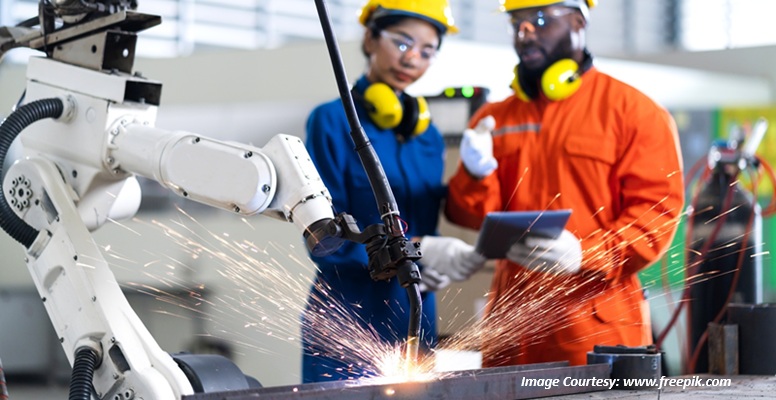
AI-Powered Welding Robots setting a new standard in Top-Tier Automotive Plants
As manufacturing plants undergo digital transformation and Industry 5.0 expectations, AI-powered welders will become more common, says Emily Newton.
Read more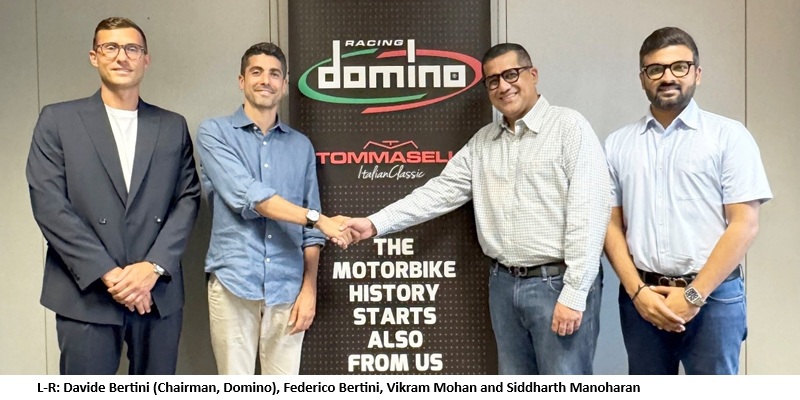
Pricol Partners with Italy's Domino to Advance Two-Wheeler Control Technologies
Pricol Limited joins hands with Italy’s Domino S.r.l. to deliver advanced two-wheeler handlebar control systems across India and Southeast Asia, reinforcing its innovation-driven growth strategy.
Read more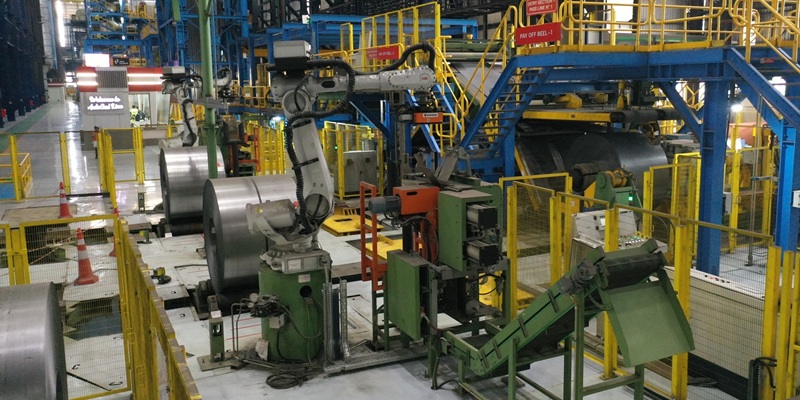
AM/NS India opens Continuous Galvanising Line for High-Strength Automotive Steel
New facility engineered to manufacture world-class specialised, high-grade steel for automotive applications, with strength levels up to 1180 MPa; to substitute imports. The modern unit is part of t..
Read moreRelated Products
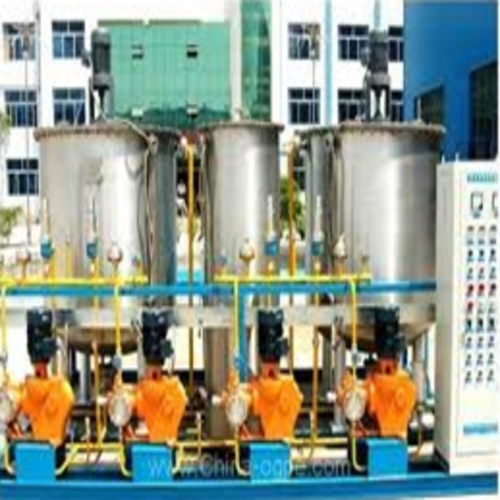
Ozone System
Omnicorp Environs & Infratech Co offers a wide range of ozone systems.
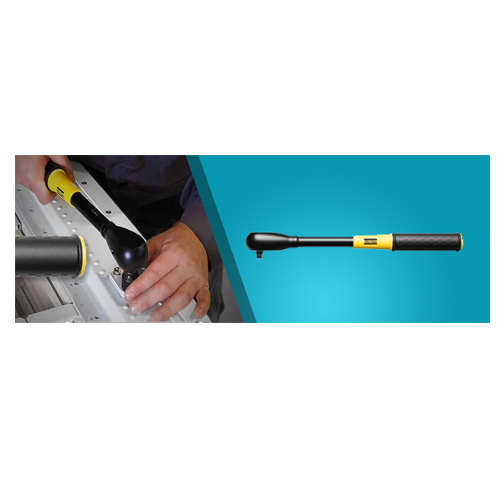
SWR ’Slipping’ Wrenches
Reliable
Trade Links offers a wide range of SWR ’slipping’ wrenches.

Gripping Systems – Rgg
Schunk Intec India Pvt Ltd offers a wide range of Gripping Systems – RGG - cleaning
device with shank interface.















